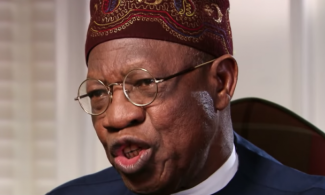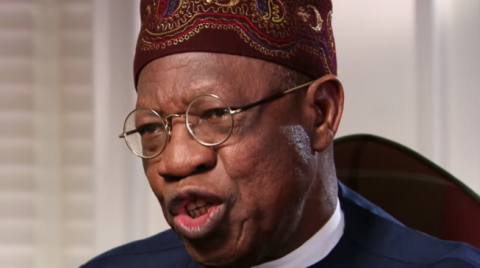
Lai Mohammed, Minister of Information and Culture, announced the rejection on Tuesday in Abuja during a courtesy visit by the executive members of the Nigerian chapter of the International Press Institute (IPI).
The Nigerian government has rejected the 2021 annual World Press Freedom Index that characterised Nigeria as a country not conducive to the practice of journalism,
Lai Mohammed, Minister of Information and Culture, announced the rejection on Tuesday in Abuja during a courtesy visit by the executive members of the Nigerian chapter of the International Press Institute (IPI).

According to Mohammed, the Nigerian press remains among the most vibrant and freest in the world.
Mr. Muskilu Mojeed, President of IPI Nigeria, who led the team, had cited the World Press Freedom Index as an example of the country’s low rating in the area of press freedom.
But Mohammed disagreed, saying, “I disagree with your assessment of press freedom under this government.
“Honestly, at times when I read what the media write here about Nigeria, I begin to wonder whether I live in the same country that they are writing about.
“I disagree vehemently with the assessment because it is unfounded and has no scientific basis.
“I have been the Minister (of Information and Culture) since 2015 so I know the state of press freedom in Nigeria.”
According to him, President Muhammadu Buhari's government is not a threat to the free press.
He said some people have mistaken the government’s efforts to ensure responsible use of social media for tampering with press freedom.
He said, “After all, this must be one of the very few countries in the world where a section of the media can refuse to recognise popular sovereignty, or how does one describe a situation in which a President who was duly elected by millions of Nigeria is willfully stripped of that title, President, and then cheekily cloaked in the garb of a dictator by playing up his military title? “Despite that abuse of press freedom, those doing that have continued to practise their profession without hindrance. Ours must also be one of the few countries in the world where a reputable medium will report fake news and, when called out, will not retract or apologise.”
Urging IPI Nigeria to take the issues of ethics, credibility and fake news in relation to the practice of journalism in the country seriously, Mohammed asked, “For example, on the issue of ethics, is it part of the ethics of journalism for a media organisation to function like an opposition party, seeing nothing good in the government of the day and only reporting bad news?”
Human Rights Watch (HRW) in August 2018 reported that on August 16, 2018, an Abuja Magistrate court conditionally released Jones Abiri, a journalist and publisher of Weekly Source Newspaper in Yenagoa, Bayelsa State.
He had been held for more than two years after his July 26, 2016 arrest by State Security Service (Department of State Services) agents. A statement by the security agency after his arrest accused Abiri of leading the Joint Niger Delta Liberation Force, a group allegedly furthering separatist tendencies in the Niger Delta. A Committee to Protect Journalists report said, however, his family believed his arrest was prompted by a controversial article republished by the Weekly Source.
Abiri was held incommunicado at an undisclosed location, despite efforts of family, lawyers, and the Nigerian Union of Journalists to reach him. A social media campaign and a lawsuit for his release filed on July 3, 2018, put pressure on the security service to finally charge and produce him before an Abuja Magistrate court on August 2, where he faced a charge of criminal intimidation.
In another case, the defunct Police Special Anti-Robbery Squad arrested and detained a Premium Times journalist, Samuel Ogundipe, on August 14. Premium Times reported he was arrested for refusing to disclose his source for his August 9 article about a report by the former police inspector general, Ibrahim Idris, to acting president Yemi Osinbajo.
The police said Ogundipe was arrested and charged with theft and unlawful possession of restricted and classified documents. He was conditionally released on August 17, but his trial was set for a later date.
In January 2017, the police raided the Premium Times office in Abuja and arrested the publisher, Dapo Olorunyomi, and the judiciary correspondent, Evelyn Okakwu. They were released after a few hours. The arrest was allegedly carried out based on a complaint filed by the former chief of army staff, General Tukur Buratai, after Premium Times published damning reports alleging corruption and human rights violations by the military.